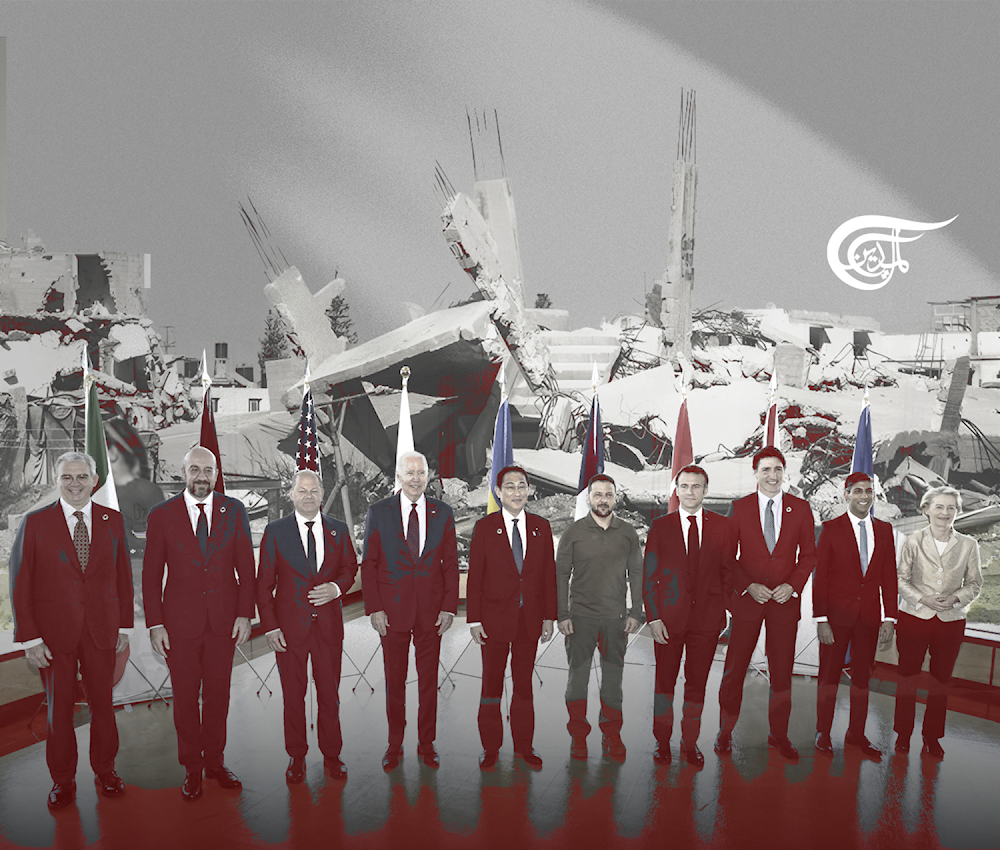Cutting through the G7’s humanitarian façade
The recurring practice of glorifying the occupation and its apartheid machinery is in line with the damage dealt to the UN Security Council’s efforts by Washington, a top influencer of G7 direction.
-

The G7’s utilization of street power within its borders, denial of a ceasefire, and manipulation of popular discourse away from Palestinian suffering are all telling reminders that it implicitly sustains occupation genocide (Illustrated by Mahdi Rteil for Al Mayadeen English)
For a grouping of privileged democracies that repeatedly claims the mantle of human rights in the West, it is impossible to rationalize the Group of Seven (G7)’s carte blanche to occupation genocide in Gaza. Individual states once actively vouching for a so-called “rules-based” order now take exception to a besieged population’s inalienable right to exist, assemble, and prevail in the face of occupation brutalities. As a collective, G7’s complicity in denying a ceasefire is even more evident: countries align with the dangerous illusion of a “humanitarian pause” that furthers Israeli ground invasion and exposes G7’s recognition of Palestinian peace as mere lip service.
Connect the dots yourself. After the Group of Seven (G7) foreign ministers released a highly cosmetic statement on the Gaza aggression, the bloc continued its approval of occupation atrocities by refusing to situate Palestinian rights within its foreign policy coordination. Key members of the West-dominated bloc are silent as the occupation steps up its genocide beyond the 11,100 casualty mark, including thousands of children. That is one out of every 200 people, while G7 chair Japan offers nothing but hollow sympathies to Palestine and refuses to do more on accountability for occupation war crimes. “Japan’s government should also explicitly call out war crimes for which Israeli authorities are responsible, including cutting off water and electricity, a form of collective punishment, and blocking all but a trickle of humanitarian aid,” warned the Human Rights Watch in its scathing assessment.
All the while Washington maintains its outsized pressure on Germany and other G7 allies to even refuse the word “ceasefire” in popular discourse. Such blatant lobbying for oppression ends the case for so-called urgent G7 “action to address the deteriorating humanitarian crisis in Gaza.”
Begin with Germany’s blatant doublespeak on Palestinian and Western lives. German Chancellor Olaf Scholz recently expressed his disapproval of an "immediate" ceasefire in the Gaza Strip, employing an apologetic stance towards the Israeli genocide and suggesting Palestinian lives remain outliers on justice.
For a country that claims to stick to a principled stance against mass massacres, historic genocides, and ethnic cleansing, Berlin touts the fiction that an urgent ceasefire could harm the occupation itself, concluding that global calls to end violence are just not right. Such dismissive positions against visible Israeli belligerence are chief to a climate of impunity in Germany where authorities stamp-out pro-Palestinian protests and their message against a West-assisted genocide. This is similar to crackdowns against justice and accountability across select G7 states. For instance, France came through on its criticism of documented Israeli aggression against Palestinians, calling for an end to the Israeli bombardment spree. But its top leader failed to show spine where it actually mattered: striking down Israeli propaganda that it can never shoulder any blame for its war crimes.
Thus, seasonal rebukes and a deliberate effort to dash ceasefire prospects speak volumes about the G7’s double standards on one of the most brutal genocides in modern memory. One should reject the argument that this privileged group of world economies can do nothing in the interests of Palestine: their collective clout is enough to accelerate international pressure on the Israelis and demand a swift reckoning for the occupation’s bombing campaign. But since the plight of Palestinians doesn’t appear to carry favorable Western overtones, G7 states sustain conditions that greenlight occupation massacres and treat Palestinian lives through a different yardstick.
Canada is a fitting example of such hypocrisy. Its latest calls for food and fuel to be allowed into Gaza is a poor sell when Ottawa deliberately voted against four UN General Assembly resolutions, including two supporting Palestine refugees and one condemning Israeli settlements. Similarly, there is zero credibility to individual G7 member positions to “support” the United Nations refugee agency for Palestinians, UNRWA. Now that the same UN agency feels compelled to halt its humanitarian operations due to occupation belligerence and a ban on fuel, where is Canada and the G7’s principled protest against the Israelis?
This is important because this recurring practice of glorifying the occupation and its apartheid machinery is in line with the damage dealt to the UN Security Council’s efforts by Washington, a top influencer of G7 direction. "All UN representatives have been jointly calling for an 'immediate humanitarian ceasefire', which would end this inhumane collective punishment, the suffering of children, women, and the elderly," the Russian Foreign Ministry said in a statement recently. "However, the Security Council can’t execute its direct mandate and remains paralyzed thanks to the position of a single country – the US.”
Protest is a powerful weapon against all forms of oppression. However, rising G7 intolerance towards pro-Palestinian voices reflects a deliberate attempt to force popular discourse into favoring genocide. Scores of Palestinian-Canadians have been slapped with hate crimes for supporting liberties in Gaza, while public crackdowns and instances of suppressions across workplaces have grown across key G7 economies – from the United States, France and Germany to Canada. Progressive activists in the United States continue to appear on the fringes of policy direction towards the occupation, despite a recent State Department memo accusing Biden of misinformation on Gaza, and recognizing a streak of Israeli war crimes that have gone unheeded.
As a result, the G7’s utilization of street power within its borders, denial of a ceasefire, and manipulation of popular discourse away from Palestinian suffering are all telling reminders that it implicitly sustains occupation genocide through speech and action.

 Hannan Hussain
Hannan Hussain
 6 Min Read
6 Min Read











